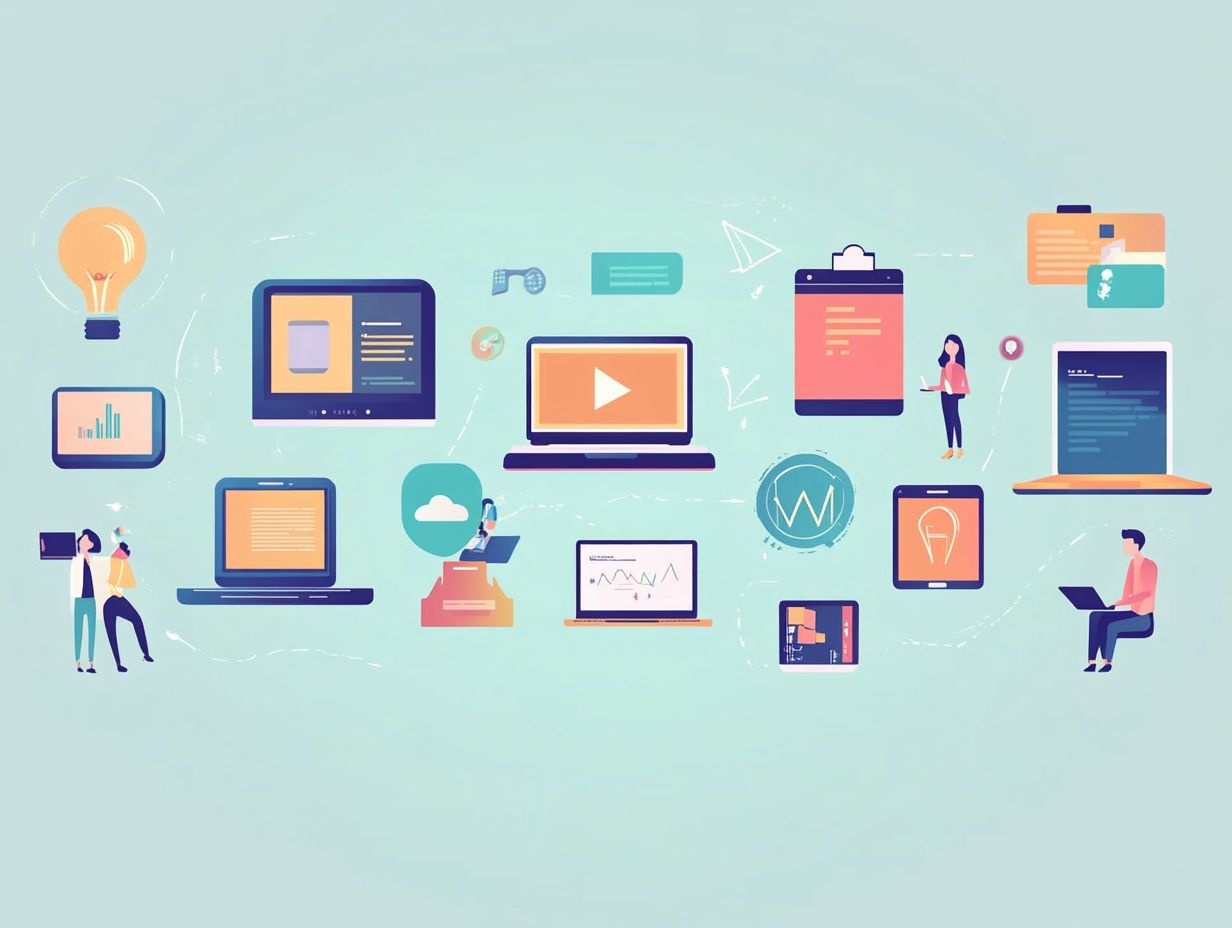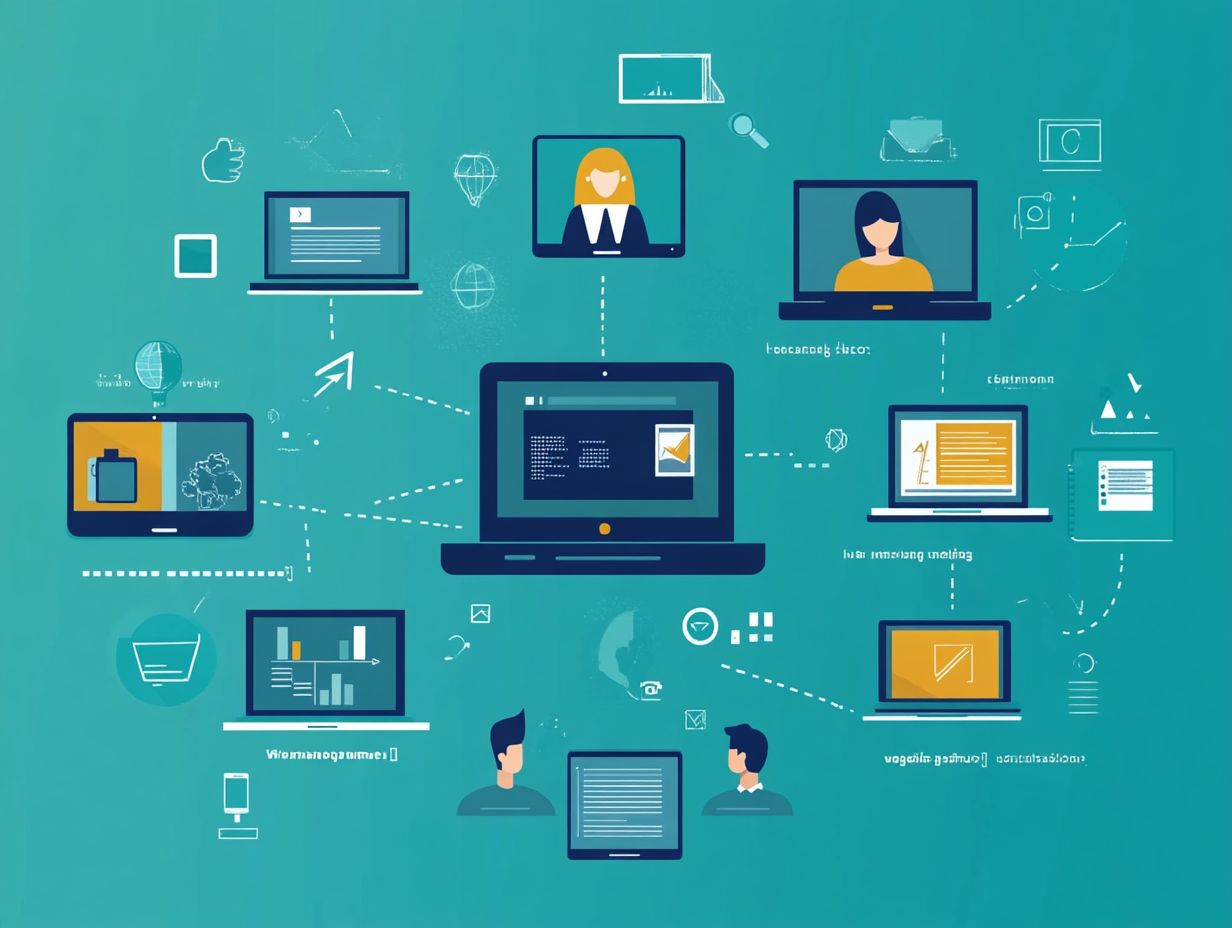The Evolution of E-Learning in Corporate Training
E-learning has revolutionized corporate training, moving away from conventional techniques to embrace innovative, technology-driven methods.
This article invites you to explore the journey of e-learning, tracing its historical roots and delving into the technological advancements that have shaped its evolution. It highlights the myriad benefits you can enjoy, such as cost-effectiveness and flexibility, while also addressing emerging trends and challenges that could impact its future.
Join in as you discover the essential role e-learning plays in today s corporate landscape.
Contents
- Key Takeaways:
- The History of E-Learning in Corporate Training
- The Benefits of E-Learning in Corporate Training
- The Future of E-Learning in Corporate Training
- Frequently Asked Questions
- What is the evolution of e-learning in corporate training?
- How has e-learning changed the landscape of corporate training?
- What are some benefits of incorporating e-learning in corporate training?
- What are the challenges of implementing e-learning in corporate training?
- How has the COVID-19 pandemic impacted the evolution of e-learning in corporate training?
- What does the future hold for the evolution of e-learning in corporate training?
Key Takeaways:
Here are the key insights you shouldn t overlook!

- E-learning has evolved significantly since its early forms, incorporating new technologies and adapting to changing needs in corporate training.
- Cost-effectiveness, scalability, flexibility, and personalization are key benefits of e-learning, making it a popular and efficient choice for corporate training.
- The future of e-learning in corporate training is promising, with the potential for even more advancements and the need to address challenges and embrace new opportunities.
Defining E-Learning and its Role in Corporate Training
E-learning, which harnesses digital platforms for educational purposes, is essential in corporate training. It elevates employee engagement and offers cost-effective solutions tailored to various learning needs.
Unlike traditional methods, e-learning provides flexible training options that cater to individual motivations, creating a personalized learning experience that aligns seamlessly with your organizational goals.
This digital approach enables you to swiftly adapt training materials and streamline content delivery based on real-time feedback. It is particularly effective in your fast-paced corporate environment.
User-friendly platforms and training management systems, which are software that helps manage training, simplify the training process, ensuring employees can easily navigate resources and monitor their progress.
The integration of communication tools fosters collaboration among employees. This enriches their learning journey by facilitating discussions and idea exchanges, no matter where they are located. In this way, e-learning not only enhances accessibility but also nurtures a culture of continuous improvement, which is crucial in today s competitive landscape.
The History of E-Learning in Corporate Training
The history of e-learning in corporate training presents a captivating journey that unfolds over several decades. It all began with early initiatives from industry pioneers like IBM, who sought to integrate technology into their training programs, paving the way for the impact of video learning in corporate training.
This foundation has since evolved into sophisticated Learning Management Systems (LMS), which enable Continuous Learning and are perfectly suited for today s fast-paced business environment.
Early Forms of E-Learning
Early forms of e-learning in corporate training primarily centered on distance education, using basic online courses to deliver essential training content to employees. This approach stood in stark contrast to traditional learning methods, which heavily relied on in-person instruction.
These initial efforts to incorporate digital resources enabled companies to reach a broad audience and offer training programs that seamlessly fit into diverse schedules. However, early adopters faced technological limitations and resistance from employees who were accustomed to conventional classroom settings.
Many organizations struggled with the lack of engagement and interactivity in these early modules, often resulting in inconsistent knowledge retention among staff. Nevertheless, the insights gained during this period laid crucial groundwork for refining modern corporate education techniques, paving the way for more dynamic and immersive online environments that cater to various learner needs.
Don t miss out on the advantages e-learning offers your organization!
Technological Advancements and Their Impact on E-Learning

Technological advancements, especially the rise of Artificial Intelligence and gamification (using game-like elements to make learning more engaging), have dramatically transformed e-learning in corporate training. These innovations enhance training management systems and enable instant feedback, significantly improving your learning experience and knowledge retention.
With these tools at your disposal, personalized learning pathways become a reality. This allows you to engage with content that aligns perfectly with your unique skill set and career aspirations. By harnessing data analytics, your organization can pinpoint knowledge gaps and tailor training programs accordingly. This ensures that your learning is both relevant and effective.
The integration of Virtual Reality (VR) and Augmented Reality (AR) offers immersive scenarios for practicing real-world skills in a safe environment. This makes training not only more interactive but also enjoyable. It fosters a culture of continuous learning that ultimately enhances both your performance and job satisfaction.
The Benefits of E-Learning in Corporate Training
E-learning presents a wealth of advantages for corporate training. By enhancing employee productivity through cost-effective solutions, it enables remote training and promotes deeper knowledge acquisition. This paves the way for exciting skill development opportunities that align perfectly with your organization s goals.
Cost-effectiveness and Scalability
One of the standout benefits of e-learning in corporate training is its cost-effectiveness and scalability. This allows you to implement training programs that effortlessly adapt to the evolving needs of your workforce.
By utilizing online learning platforms, you’re equipped to significantly cut expenses related to travel, venue rentals, and printed materials. This provides a consistent and manageable training experience for your employees.
Imagine harnessing virtual classrooms or learning management systems that offer on-demand courses. This enables your staff to learn at their own pace and at times that fit their schedules. This approach not only saves you money but also cultivates a culture of continuous improvement and skills enhancement.
Over time, you’ll see the long-term benefits manifest as a more skilled workforce, reduced turnover rates, and improved employee satisfaction. Ultimately, this contributes to your company s profitability and capacity for innovation.
Flexibility and Personalization
The flexibility and personalization of e-learning in corporate training enable you to embark on learning paths tailored to your unique needs, preferences, and schedules. This significantly enhances your overall learning experience.
This adaptability allows you to progress at your own pace, diving deeper into subjects that resonate with your role while effortlessly bypassing material you re already familiar with.
E-learning platforms utilize advanced technologies to track your progress and provide customized content. This transforms what was once a one-size-fits-all approach into a truly bespoke experience.
The importance of personalized learning in skill development is immense. It enables you to concentrate on areas that propel your career growth, ultimately leading to greater job satisfaction and increased productivity.
This approach cultivates a growth mindset, nurturing an environment where continuous learning becomes an integral part of the corporate culture.
The Future of E-Learning in Corporate Training

The future of e-learning in corporate training is on the brink of transformation, driven by emerging technologies and latest trends in corporate training that prioritize digital transformation and continuous learning.
This shift is set to redefine how organizations approach employee development and training strategies, enhancing overall effectiveness and engagement.
Don’t miss out on the chance to enhance your skills! Dive into the world of e-learning today and unlock your potential!
Emerging Technologies and Trends
Emerging technologies like Virtual Reality and artificial intelligence, coupled with innovative methodologies such as micro-learning (short, focused learning segments), are transforming the realm of eLearning in corporate training. Provide employees with immersive and highly interactive experiences that truly engage them.
These advancements enable you to create training modules that are captivating and specifically tailored to individual learning preferences. For instance, with Virtual Reality, you can simulate real-life situations, allowing employees to practice their skills in a safe space to practice whether it’s mastering a complex machinery repair or navigating unexpected customer interactions.
On the other hand, AI-driven platforms provide personalized feedback and adjust learning content based on the user’s progress. This targeted approach significantly boosts learner engagement and enhances knowledge retention, ultimately fostering a more skilled and confident workforce.
Challenges and Opportunities
eLearning offers a wealth of opportunities for corporate training, but it also presents challenges that require careful navigation to enhance the learner experience and leverage data-driven insights for program optimization.
You could face initial resistance to technology adoption act now to overcome it! Employees may find it difficult to adapt to new platforms or prefer the familiarity of traditional learning methods. Maintaining engagement can be another hurdle, with many learners struggling to stay motivated in a virtual environment. However, these challenges can also drive growth rather than act as roadblocks.
By investing in user-friendly technologies and incorporating interactive elements into your training, you can spark enthusiasm and creativity among your employees. This strategic shift not only elevates the overall learning experience but also cultivates a culture of continuous improvement, ensuring your training remains relevant and impactful.
Frequently Asked Questions
What is the evolution of e-learning in corporate training?

The evolution of e-learning in corporate training refers to the development and advancements of digital educational tools and platforms used to train employees in a corporate setting, highlighting the future of e-learning in corporate training.
How has e-learning changed the landscape of corporate training?
E-learning has revolutionized the way corporate training is conducted, providing a more convenient, cost-effective, and efficient way of delivering learning materials to employees. To understand this further, you might explore what blended learning in corporate training is.
What are some benefits of incorporating e-learning in corporate training?
Some benefits include flexibility for employees to learn at their own pace, access to a wide range of training materials, and real-time tracking of employee progress and performance.
What are the challenges of implementing e-learning in corporate training?
Challenges may include resistance to change, technical difficulties, and the need for proper training and support for both employees and trainers.
How has the COVID-19 pandemic impacted the evolution of e-learning in corporate training?
The COVID-19 pandemic has accelerated the adoption and evolution of e-learning in corporate training, as many companies had to shift their training programs online. For those looking for effective solutions, exploring the top 10 e-learning platforms for corporate training can provide valuable insights into suitable options for remote work arrangements and social distancing measures.
What does the future hold for the evolution of e-learning in corporate training?
The future is expected to continue growing and evolving, incorporating emerging technologies such as artificial intelligence and virtual reality to enhance the learning experience for employees.






